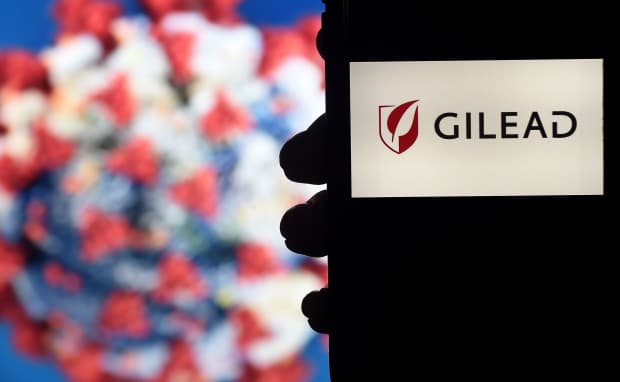This post was originally published on this site

Gilead Sciences Inc. reported the first earnings report with contribution from its COVID-19 antiviral drug Wednesday.
AFP/Getty Images
In the first quarter of sales of its COVID-19 antiviral drug, Gilead Sciences Inc. produced better profit and sales than expected, sending its beleaguered shares higher in late trading Wednesday.
Gilead GILD, -2.15% reported third-quarter earnings of $360 million, or 29 cents a share, on revenue of $6.58 billion, up from $5.6 billion a year ago. After adjusting for acquisition-related expenses, the company reported earnings of $2.11 a share, up from $1.75 a share in the same quarter a year ago. Analysts on average expected adjusted earnings of $1.90 a share on sales of $6.3 billion, according to FactSet.
Gilead reported sales of $873 million for Veklury, its COVID-19 treatment previously known as remdesivir, beating expectations. The drug received an emergency-use provision from the Food and Drug Administration in May. President Donald Trump received the medication after he was diagnosed with the coronavirus, and Veklury was fully approved by the FDA earlier this month, the first COVID-19 drug to receive a full FDA approval during the pandemic.
The initial returns from Veklury were the subject of hot debate heading into the earnings report, as the returns for Gilead depended on who received the bulk of its early shipments: the government or the private sector, the latter of which would have resulted in larger revenue from the drug. Analysts on average had expected sales of $772 million, according to FactSet, though Mizuho Securities analyst Salim Syed said the Wall Street consensus was more like $1 billion and Citigroup analyst Mohit Bansal wrote that the total could be up to $1.5 billion if drug wholesalers snapped up all that Gilead could make.
For more: What is remdesivir and who is allowed to receive it?
Gilead said Viklury sales were “primarily” made in the U.S.
“Veklury revenue is generated in a highly dynamic and complex global health environment, which continues to evolve,” the company disclosed in its release. “As a result, Veklury revenue is subject to significant volatility and uncertainty.”
Gilead gets the bulk of its sales from medications for HIV and AIDS. Those products produced sales of $4.55 billion in the quarter, according to Gilead, up from $4.2 billion a year ago.
Gilead shares increased more than 2.5% in after-hours trading following the results, after a daily decline of 2.2% to $58.72 in the regular session. The stock has declined 20% in the past three months amid concerns about actual returns from Veklury and an expensive acquisition, as the S&P 500 index SPX, -3.52% has gained 5.4% in that period.

